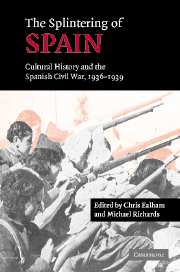Book contents
- Frontmatter
- Contents
- List of illustrations
- List of maps
- List of contributors
- Preface
- List of abbreviations
- Chronology
- Maps showing the division of Spain, 1936-1939
- 1 History, memory and the Spanish civil war: recent perspectives
- Part I Overviews: violence, nationalism and religion
- Part II Republican political and cultural projects
- 5 Catalan populism in the Spanish civil war
- 6 The myth of the maddened crowd: class, culture and space in the revolutionary urbanist project in Barcelona, 1936–1937
- 7 The culture of empowerment in Gijón, 1936–1937
- Part III Identities on the Francoist side
- Notes
- Index
5 - Catalan populism in the Spanish civil war
Published online by Cambridge University Press: 28 July 2009
- Frontmatter
- Contents
- List of illustrations
- List of maps
- List of contributors
- Preface
- List of abbreviations
- Chronology
- Maps showing the division of Spain, 1936-1939
- 1 History, memory and the Spanish civil war: recent perspectives
- Part I Overviews: violence, nationalism and religion
- Part II Republican political and cultural projects
- 5 Catalan populism in the Spanish civil war
- 6 The myth of the maddened crowd: class, culture and space in the revolutionary urbanist project in Barcelona, 1936–1937
- 7 The culture of empowerment in Gijón, 1936–1937
- Part III Identities on the Francoist side
- Notes
- Index
Summary
The origins of Catalan populism
Despite the dubiousness of most Spanish discourses of exceptionalism, Catalan politics in the 1930s was different. From the birth of the Spanish Republic in 1931, this difference was testified by the existence of a subsidiary political system – an autonomous regional government which acquired its own parliament and law-making powers in 1932. Within this institutional framework, the interacting pressures of leftist Catalan nationalism, a strong anarcho-syndicalist movement, and the eventual appearance of Marxist parties generated an original political demand which may be called populist.
Starting with its overt politicisation in 1901, Catalan nationalism introduced the ideal of a new kind of regional administration. This administration was born of devolution and was carried out in the Catalan language. It was capable of substituting the failing central bureaucracy with the offer of better services (such as education) and of serving as a means of social promotion. Barcelona was the centre of the rise of modern rival corporativisms in Spain, as well as the debate surrounding the viability of civil society (and therefore of civic culture) in the face of state intervention. This had a surprising potential for peculiar (and often contradictory) understandings between the ideological and organisational polarities that developed and matured in the years during and after the First World War. The cultural protectionism of ‘Catalanism’ was offered especially to internal Catalan immigrants from the local countryside to the big city.
- Type
- Chapter
- Information
- The Splintering of SpainCultural History and the Spanish Civil War, 1936–1939, pp. 93 - 110Publisher: Cambridge University PressPrint publication year: 2005
- 1
- Cited by

